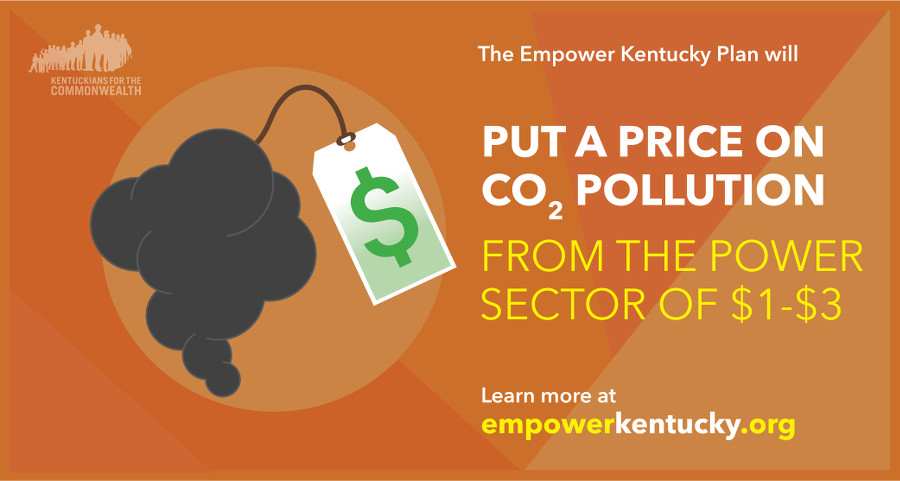“It’s going to take teams of people to bring people to town hall meetings or community forums. We need a process to find out what people are saying and asking for. It’ll take pilot programs to see what works, and training people how to do the work. And we’ll need funding to really make solutions work.”
– A Seat At The Table Participant, Covington, Kentucky
What is this and why is it important?
A just transition to a clean energy economy is possible in Kentucky with the right mix of equitable public investments and policy choices. Thoughtful public policies can leverage significant private investments in our energy transition and direct new jobs and investments towards the communities and workers who need them most.
Building our next energy economy in Kentucky means making choices about how we invest public funds and attract private investments to achieve the best possible outcomes for Kentuckians. It’s important to remember that even if policy-makers do nothing, utilities in Kentucky will still spend billions of dollars in the next 15 years to upgrade coal plants, build more natural gas plants and pipelines, and pay for the rising costs of fuel and pollution. Those are risky and expensive choices. We can make better ones.
Instead of spending resources for a future powered by fossil fuels, the Empower Kentucky Plan prioritizes investments in energy efficiency and renewables. These no-regrets, low-risk strategies will create more jobs, lower energy bills, better health than the business as usual approach. And, along with investments in a just transition, they can help build a thriving clean energy economy across our commonwealth.
The energy efficiency goals of the Empower Kentucky plan alone will lead utilities and customers to invest $11 billion in energy conservation measures over the next 15 years. This plan also raises nearly $2 billion from a fee on CO2 pollution, and reinvests those resources in energy efficiency and a Just Transition Fund.
Importantly, an analysis by Synapse Energy Economics found that the overall cost of the Empower Kentucky Plan (including capital expenses, operating and maintenance, energy efficiency, environmental retrofits, transmission construction, and imported electricity) is just 3% higher than the cost of business as usual. Meanwhile, average residential bills are actually lower under the Empower plan, due to the substantial priority on energy efficiency.
Why a fee on CO2 pollution?
The Empower Kentucky Plan recommends a price on CO2 pollution in our electric power sector starting at $1 in 2018 and rising to $3 over 15 years. By 2032 this policy will generate nearly $2 billion in revenue. Eighty percent, or $1.5 billion, will be reinvested in efficiency programs across our economy and $387 million will be directed to a Just Transition Fund for affected workers and communities.
The recommended price of $1-3 per ton may appear too low to some, while alarming others. In fact, this proposed fee is far lower than many other policies across the US. According to a determination by the Obama Administration, the true cost to society of CO2 pollution is just under $40 per ton. Carbon trading programs in the northeastern states and California currently result in CO2 prices that range from about $3.50 to $12 per ton. And recent long-term plans submitted to the Kentucky Public Service Commission by LG&E, Big Rivers, Duke, Kentucky Power and other utilities show they anticipate paying anywhere from $10 to $54 per ton of CO2 over the next 20 years.
The Empower Kentucky Plan recommends the low $1-3 price per ton of CO2 pollution during the next 15 years. With help from Synapse Energy Economics, we evaluated a number of other scenarios, ranging from $1-30, to examine the impacts on emissions, jobs, bills, and Kentucky’s energy mix. In the process, we discovered that higher prices for CO2 at this time will likely accelerate Kentucky’s rush to build new natural gas plants. The relatively low CO2 price we propose seems “not-too-hot and not-too-cold” for this time frame in Kentucky. It is high enough to drive down power plant pollution, but not so high that it drives us towards a larger natural gas infrastructure.
As the costs of renewable energy continue to plummet, we may soon reach a moment in Kentucky where a higher price on CO2 will result in greater investments in renewable generation, rather than in gas. Until then, we believe the relatively low price we propose achieves important objectives of protecting our health and climate while also supporting Kentucky’s just transition to a clean energy future.
Of course there are different ways to design CO2 policy, and there are different ways to allocate or re-invest the revenue. Along with many of groups working for environmental justice and a just transition, we have grave concerns about many approaches to carbon trading or carbon tax schemes. We believe any proposal to put a price on carbon pollution should:
- Be part of an overall, comprehensive approach to improve health, create jobs, lower energy bills, advance equity and a just transition, and reduce harmful climate pollution.
- Reinvest in a Just Transition, clean energy projects benefitting low-income and people of color communities, and clean energy transformation across our economy.
- Ensure that polluters can’t game the system by making windfall profits or claiming pollution reductions that don’t actually exist or don’t hold up under scrutiny.
- Avoid incentivizing risky energy solutions that further endanger our health or climate.
- Avoid schemes that unfairly benefit powerful industries and wealthy individuals or reduce overall public resources available for essential public infrastructure and services.
- Include rigorous monitoring to ensure that actual pollution reductions occur in most affected communities and system-wide.
Empower Kentucky Recommendations


- Make equitable public investments in a Just Transition for workers and communities most affected by energy sector job losses, cumulative pollution, high poverty and racial disparities by putting a price on CO2 pollution.
As described above and elsewhere in this report, we recommend a fee on CO2 pollution from Kentucky’s electric power sector and imported electricity, starting at $1 per ton in 2018 and rising to $3 per ton over 15 years. By 2032 this policy will generate nearly $2 billion in revenue.Eighty percent of these revenues, or $1.5 billion, will be reinvested in efficiency programs, including for projects that benefit low-income households, all Kentuckians, local schools and governments, small businesses, farms, and energy-intensive industries across Kentucky. In another section of the Empower Kentucky Plan, we identify a broad range of policies and best practices to ramp up energy efficiency and renewables across our economy. Those incentives and programs could be funded, at least in part, through this mechanism.
An additional $387 million will be directed to a Just Transition Fund and used to support workers and communities most affected by Kentucky’s energy transition. The just transition section of the Empower Kentucky Plan describes many programs and investments that could be funded, at least in part, through this mechanism.
- Make additional, sustained state and federal investments in Kentucky’s clean energy and just transition strategies, including:
- Pass the RECLAIM Act, a bill in Congress to invest $1 billion from the Abandoned Mine Lands Fund to restore and develop abandoned mine sites, many of which are in Kentucky and other Central Appalachian states, and the Miners Protection Act, a bill to ensure pension and health benefits for retired miner workers.
- Invest additional state and federal resources in just transition efforts, including support for affected workers and communities and clean energy transformation in affected communities. One example is a bill introduced in 2015 by Sen. Bernie Sanders. Another is a bill recently passed in the Kentucky General Assembly creating a Kentucky Coal Fields Endowment Fund to support infrastructure projects and economic diversification in coal communities. The Obama administration’s Power+ Plan and Promise Zone Initiative offer examples of the kinds of diverse investments that are possible and needed.
- Encourage private investment in clean energy and expand access to low-interest or “patient” capital and inclusive financing.
- Attract private investment to Kentucky by providing high quality education and workforce training, supporting research and development in advanced energy technologies, and creating a business and political climate that supports a growing clean energy sector.
- Eliminate policy barriers to 3rd party ownership of renewable systems and design utility rates in ways that encourage and reward customers who choose to invest in energy efficient upgrades and distributed renewable systems.
- Make inclusive financing programs (including on-bill financing, property assessed financing or other low-cost and patient financing) widely available to help all customers – including homeowners, businesses, renters, and people with low and moderate incomes – be able to afford and benefit from investments in energy efficiency and renewable energy.
- Issue a $100 million state bond to provide low-interest capital for energy efficiency and renewable energy projects on public infrastructure and authorize local governments to issue their own bonds for energy efficiency projects and investments.
- Divest from fossil fuel companies and eliminate public subsidies for fossil fuel industries.
- Individuals, colleges and universities, religious organizations, labor unions, cities, and other institutions can join the growing number of investors making the choice to divest from fossil fuel companies and reinvest instead in clean energy funds and just transition initiatives, especially projects that directly benefit communities most affected by a legacy of fossil fuel extraction.
- Eliminate state and federal subsidies for fossil fuels. US taxpayers spend $10 to $52 billion annually to subsidize some of the richest companies and industries on earth. Those figures don’t begin to describe the true costs to our health and climate.
Downloads
- Empower Kentucky Plan Executive Summary (pdf)
- Empower Kentucky Plan (pdf)
- Empowering Kentucky Synapse Analysis-Final (pdf)
- KFTC EJ Analysis Executive Summary (pdf)
- Environmental Justice Analysis for Kentucky, Technical Documentation (pdf)
Related Resources
- Divest-Invest, a website tracking divestment and investment campaigns